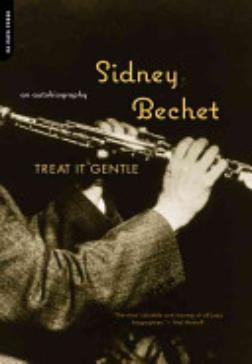
Editor, Webmaster: Phil Cartwright Editor@earlyjas.org
|
But there is another Sidney Bechet to know: the older man described by Desmond
Flower as "warm, wise, kind and gentle" whose words rolled like poetry, who humbly
sought to place his journey in perspective of the music, most notably in his autobiography,
Treat It Gentle [Twayne Publishers Inc, 1960).
To write a real analysis of Treat it Gentle would require a study longer than the text itself,
and the best I can give in this short column is a taste for Bechet’s wisdom. From the very
beginning of the book, he sets out to shift our understanding, to give us something (the
concept of giving, united to music, is a central aspect of Bechet's musical philosophy). As a
player I’ve found tremendous encouragement from his approach to music itself and the
business that surrounds it, some of which is encapsulated in this quote:
My answer--all I can say of it--it's just to be giving, giving all your life, finding the music
and giving it away. God maybe punishes a man for wanting too much, but He don't punish
a man for giving. Maybe He even fixes it so that what you give away, it's the mostest thing
you've got.
And maybe there's another thing why so many of these musicianers ended up so bad.
Maybe they didn't know how to keep up with all this commercializing that was happening
to ragtime. […] If you start taking what's pure in a man and you start putting it on a bill of
sale, somehow you can't help destroying it. In a way, all that business makes it so a man
don't have anything left to give.
I got a feeling inside me, a kind of memory that wants to sing itself...I can give you that. I
can send it out to where it can be taken, maybe, if you want it. I can try to give it to you.
But if all I've got is a contract, I've got nothing to give. How'm I going to give you a
contract? [pg 124]
This is just a taste: the book has a tremendous amount to say concerning a mature
understanding of music making itself, and the nature of jazz and the blues. In the more
than half century since its first publication, scholars have shown that the history itself
presented is not always the most accurate, but the perspective is priceless. Just as Bechet is
foundational as a soloist, I believe his musical philosophy and analysis ought to be treated
as a foundational hermeneutic for jazz.
Treat it Gentle is a book to be returned to, regularly, through the course of one's musical
life. (Available from Amazon.)
| Earlville Association for Ragtime Lovers Yearning for Jazz Advancement and Socialization |
EARLYJAS
Sidney Bechet Autobiography: Treat It Gentle

To this day, the name of Sidney Bechet evokes
intense images and stories. Feisty, explosive, operatic,
mellifluous; his blazing, intelligent eyes staring back at
us from photos: we know the stories of his temper
and his prodigal career. If Bix Beiderbecke was the
prototypically alienated young man with a horn,
Bechet was the first of the unyielding, spiritually
restless reedmen who found himself at odds with the
crass commercialism of the music business. His
abandonment and intense re-engagement of a musical
career, multiple times, was to echo through jazz
history in the careers of Artie Shaw and Sonny
Rollins. Likewise, his expatriation to Europe became
the template for such luminaries as Dexter Gordon
and Kenny Dorham.
intense images and stories. Feisty, explosive, operatic,
mellifluous; his blazing, intelligent eyes staring back at
us from photos: we know the stories of his temper
and his prodigal career. If Bix Beiderbecke was the
prototypically alienated young man with a horn,
Bechet was the first of the unyielding, spiritually
restless reedmen who found himself at odds with the
crass commercialism of the music business. His
abandonment and intense re-engagement of a musical
career, multiple times, was to echo through jazz
history in the careers of Artie Shaw and Sonny
Rollins. Likewise, his expatriation to Europe became
the template for such luminaries as Dexter Gordon
and Kenny Dorham.